Comprehensive Report on the UK Legal System and Business Laws
VerifiedAdded on 2022/12/09
|12
|4170
|64
Report
AI Summary
This report provides a comprehensive overview of the UK legal system and its impact on businesses. It begins with an introduction to business law and its importance, followed by an exploration of different sources of law, including primary (legislation, legal precedent) and secondary sources. The report then delves into the role of government in law-making, describing the legislative process in the UK. It further examines the application of statutory and common law in courts, highlighting their differences and interactions. Key sections cover the impact of contract law, company law, and employment law on businesses, providing insights into their implications and regulations. The report concludes by mentioning the legal formation, management, and funding of various types of businesses. Overall, the report aims to provide a clear understanding of the UK legal framework relevant to businesses.
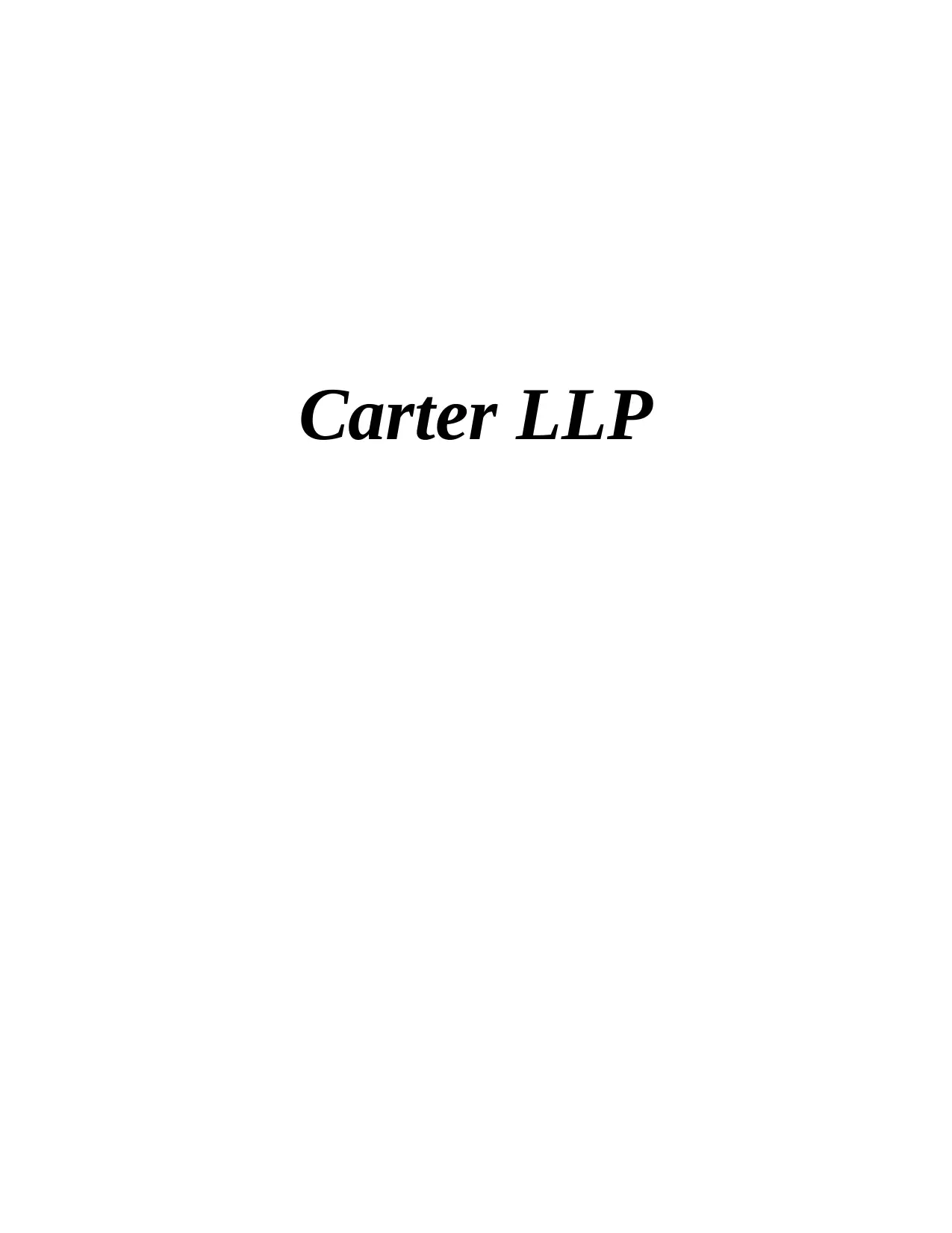
Carter LLP
Paraphrase This Document
Need a fresh take? Get an instant paraphrase of this document with our AI Paraphraser
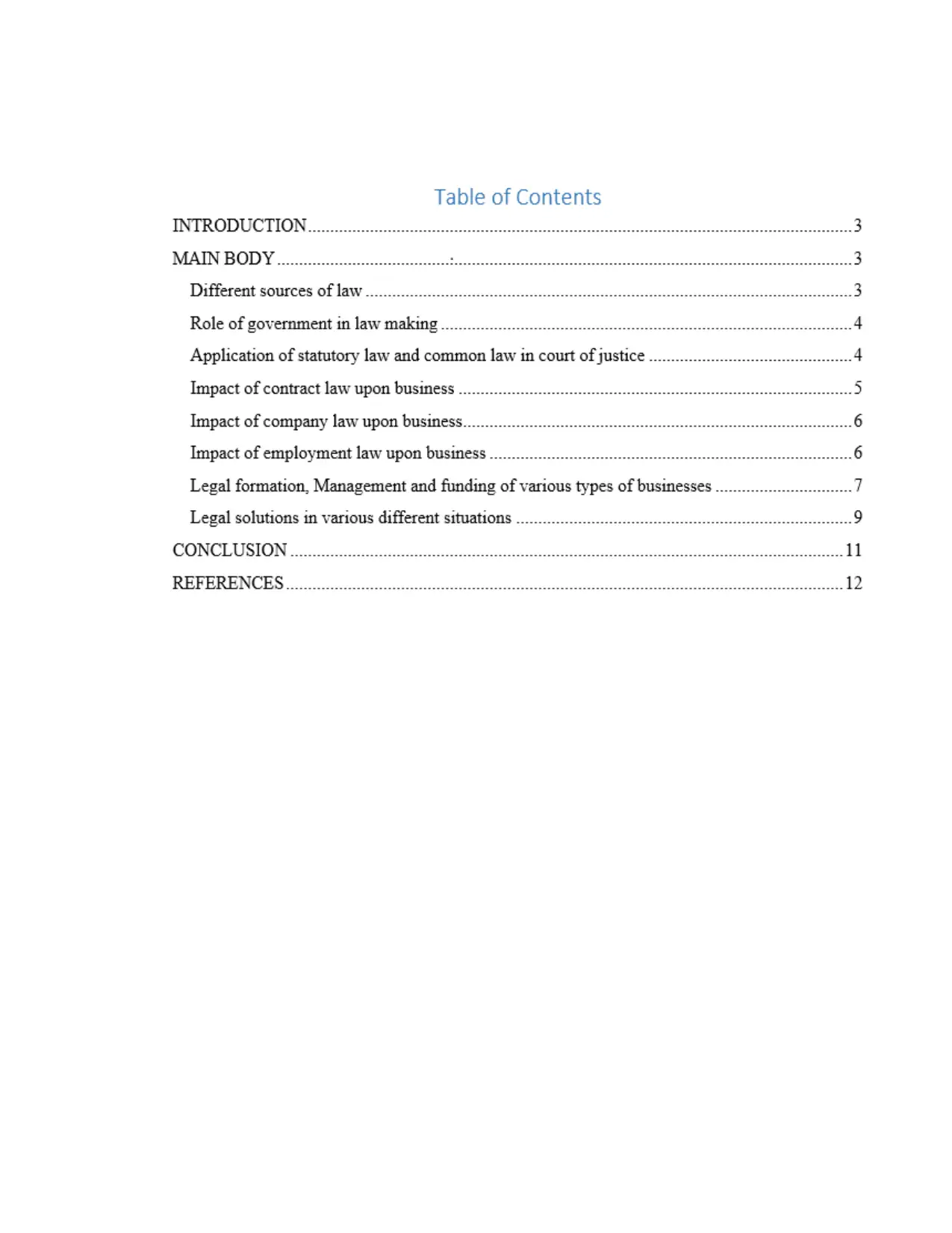
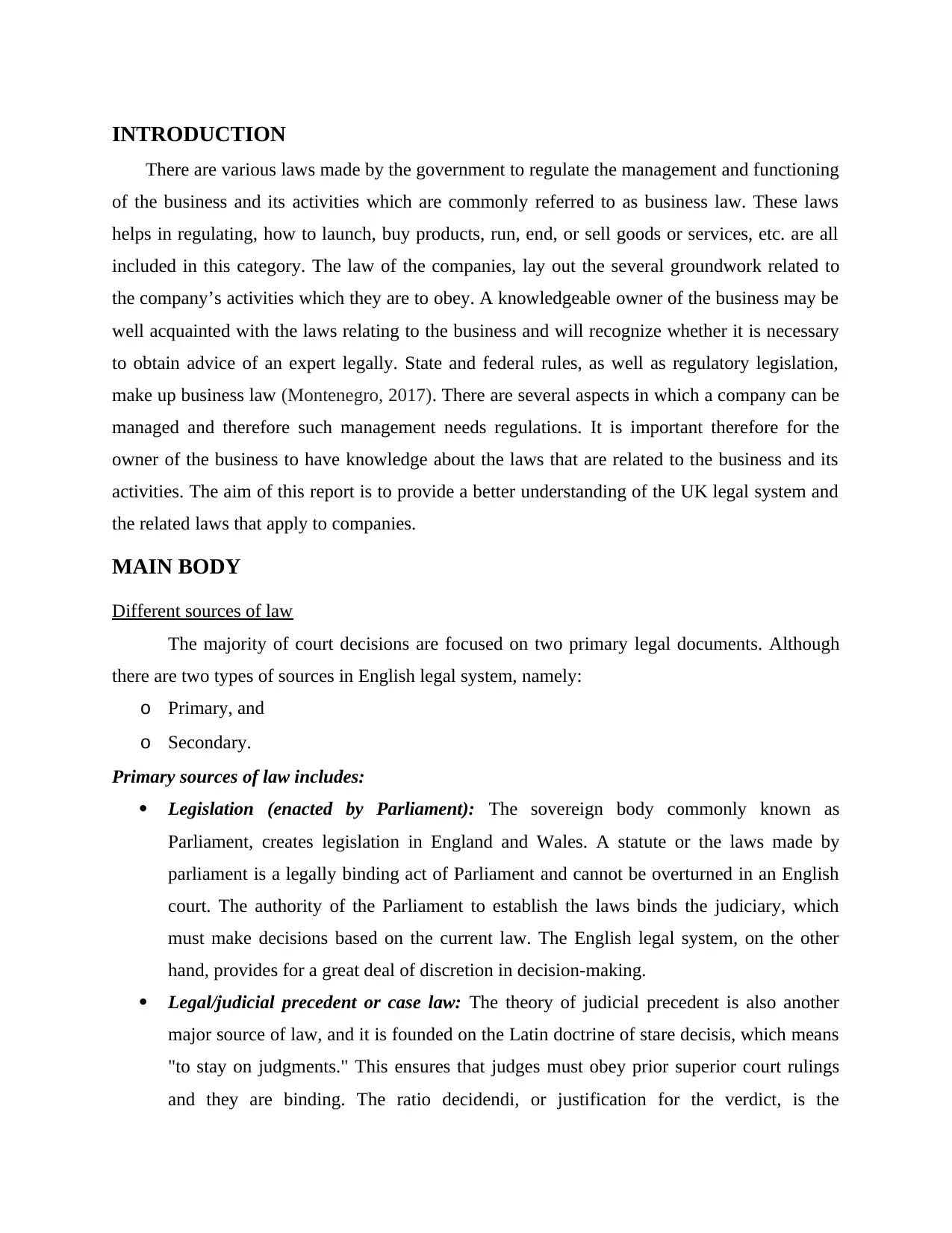
INTRODUCTION
There are various laws made by the government to regulate the management and functioning
of the business and its activities which are commonly referred to as business law. These laws
helps in regulating, how to launch, buy products, run, end, or sell goods or services, etc. are all
included in this category. The law of the companies, lay out the several groundwork related to
the company’s activities which they are to obey. A knowledgeable owner of the business may be
well acquainted with the laws relating to the business and will recognize whether it is necessary
to obtain advice of an expert legally. State and federal rules, as well as regulatory legislation,
make up business law (Montenegro, 2017). There are several aspects in which a company can be
managed and therefore such management needs regulations. It is important therefore for the
owner of the business to have knowledge about the laws that are related to the business and its
activities. The aim of this report is to provide a better understanding of the UK legal system and
the related laws that apply to companies.
MAIN BODY
Different sources of law
The majority of court decisions are focused on two primary legal documents. Although
there are two types of sources in English legal system, namely:
o Primary, and
o Secondary.
Primary sources of law includes:
Legislation (enacted by Parliament): The sovereign body commonly known as
Parliament, creates legislation in England and Wales. A statute or the laws made by
parliament is a legally binding act of Parliament and cannot be overturned in an English
court. The authority of the Parliament to establish the laws binds the judiciary, which
must make decisions based on the current law. The English legal system, on the other
hand, provides for a great deal of discretion in decision-making.
Legal/judicial precedent or case law: The theory of judicial precedent is also another
major source of law, and it is founded on the Latin doctrine of stare decisis, which means
"to stay on judgments." This ensures that judges must obey prior superior court rulings
and they are binding. The ratio decidendi, or justification for the verdict, is the
There are various laws made by the government to regulate the management and functioning
of the business and its activities which are commonly referred to as business law. These laws
helps in regulating, how to launch, buy products, run, end, or sell goods or services, etc. are all
included in this category. The law of the companies, lay out the several groundwork related to
the company’s activities which they are to obey. A knowledgeable owner of the business may be
well acquainted with the laws relating to the business and will recognize whether it is necessary
to obtain advice of an expert legally. State and federal rules, as well as regulatory legislation,
make up business law (Montenegro, 2017). There are several aspects in which a company can be
managed and therefore such management needs regulations. It is important therefore for the
owner of the business to have knowledge about the laws that are related to the business and its
activities. The aim of this report is to provide a better understanding of the UK legal system and
the related laws that apply to companies.
MAIN BODY
Different sources of law
The majority of court decisions are focused on two primary legal documents. Although
there are two types of sources in English legal system, namely:
o Primary, and
o Secondary.
Primary sources of law includes:
Legislation (enacted by Parliament): The sovereign body commonly known as
Parliament, creates legislation in England and Wales. A statute or the laws made by
parliament is a legally binding act of Parliament and cannot be overturned in an English
court. The authority of the Parliament to establish the laws binds the judiciary, which
must make decisions based on the current law. The English legal system, on the other
hand, provides for a great deal of discretion in decision-making.
Legal/judicial precedent or case law: The theory of judicial precedent is also another
major source of law, and it is founded on the Latin doctrine of stare decisis, which means
"to stay on judgments." This ensures that judges must obey prior superior court rulings
and they are binding. The ratio decidendi, or justification for the verdict, is the
⊘ This is a preview!⊘
Do you want full access?
Subscribe today to unlock all pages.

Trusted by 1+ million students worldwide
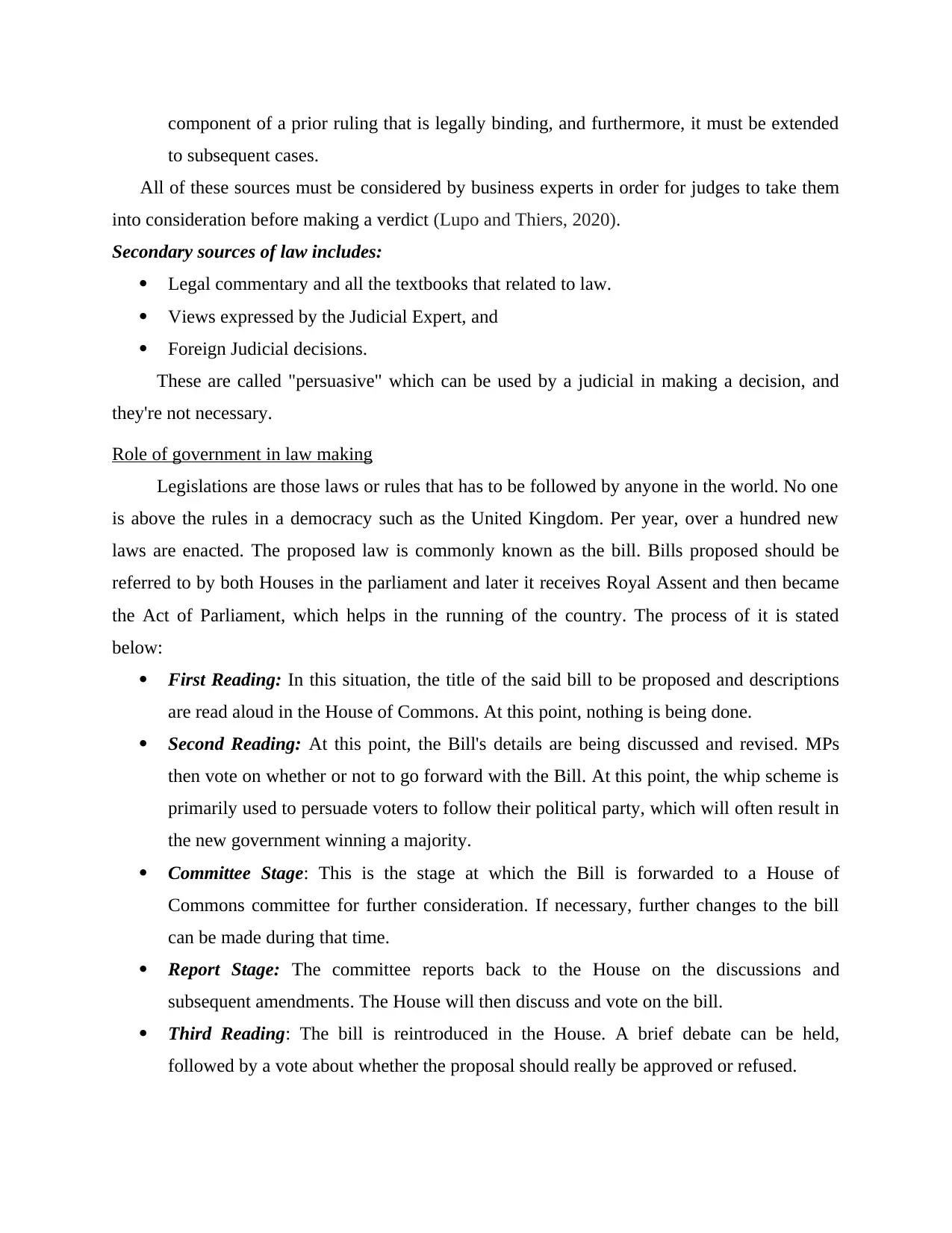
component of a prior ruling that is legally binding, and furthermore, it must be extended
to subsequent cases.
All of these sources must be considered by business experts in order for judges to take them
into consideration before making a verdict (Lupo and Thiers, 2020).
Secondary sources of law includes:
Legal commentary and all the textbooks that related to law.
Views expressed by the Judicial Expert, and
Foreign Judicial decisions.
These are called "persuasive" which can be used by a judicial in making a decision, and
they're not necessary.
Role of government in law making
Legislations are those laws or rules that has to be followed by anyone in the world. No one
is above the rules in a democracy such as the United Kingdom. Per year, over a hundred new
laws are enacted. The proposed law is commonly known as the bill. Bills proposed should be
referred to by both Houses in the parliament and later it receives Royal Assent and then became
the Act of Parliament, which helps in the running of the country. The process of it is stated
below:
First Reading: In this situation, the title of the said bill to be proposed and descriptions
are read aloud in the House of Commons. At this point, nothing is being done.
Second Reading: At this point, the Bill's details are being discussed and revised. MPs
then vote on whether or not to go forward with the Bill. At this point, the whip scheme is
primarily used to persuade voters to follow their political party, which will often result in
the new government winning a majority.
Committee Stage: This is the stage at which the Bill is forwarded to a House of
Commons committee for further consideration. If necessary, further changes to the bill
can be made during that time.
Report Stage: The committee reports back to the House on the discussions and
subsequent amendments. The House will then discuss and vote on the bill.
Third Reading: The bill is reintroduced in the House. A brief debate can be held,
followed by a vote about whether the proposal should really be approved or refused.
to subsequent cases.
All of these sources must be considered by business experts in order for judges to take them
into consideration before making a verdict (Lupo and Thiers, 2020).
Secondary sources of law includes:
Legal commentary and all the textbooks that related to law.
Views expressed by the Judicial Expert, and
Foreign Judicial decisions.
These are called "persuasive" which can be used by a judicial in making a decision, and
they're not necessary.
Role of government in law making
Legislations are those laws or rules that has to be followed by anyone in the world. No one
is above the rules in a democracy such as the United Kingdom. Per year, over a hundred new
laws are enacted. The proposed law is commonly known as the bill. Bills proposed should be
referred to by both Houses in the parliament and later it receives Royal Assent and then became
the Act of Parliament, which helps in the running of the country. The process of it is stated
below:
First Reading: In this situation, the title of the said bill to be proposed and descriptions
are read aloud in the House of Commons. At this point, nothing is being done.
Second Reading: At this point, the Bill's details are being discussed and revised. MPs
then vote on whether or not to go forward with the Bill. At this point, the whip scheme is
primarily used to persuade voters to follow their political party, which will often result in
the new government winning a majority.
Committee Stage: This is the stage at which the Bill is forwarded to a House of
Commons committee for further consideration. If necessary, further changes to the bill
can be made during that time.
Report Stage: The committee reports back to the House on the discussions and
subsequent amendments. The House will then discuss and vote on the bill.
Third Reading: The bill is reintroduced in the House. A brief debate can be held,
followed by a vote about whether the proposal should really be approved or refused.
Paraphrase This Document
Need a fresh take? Get an instant paraphrase of this document with our AI Paraphraser
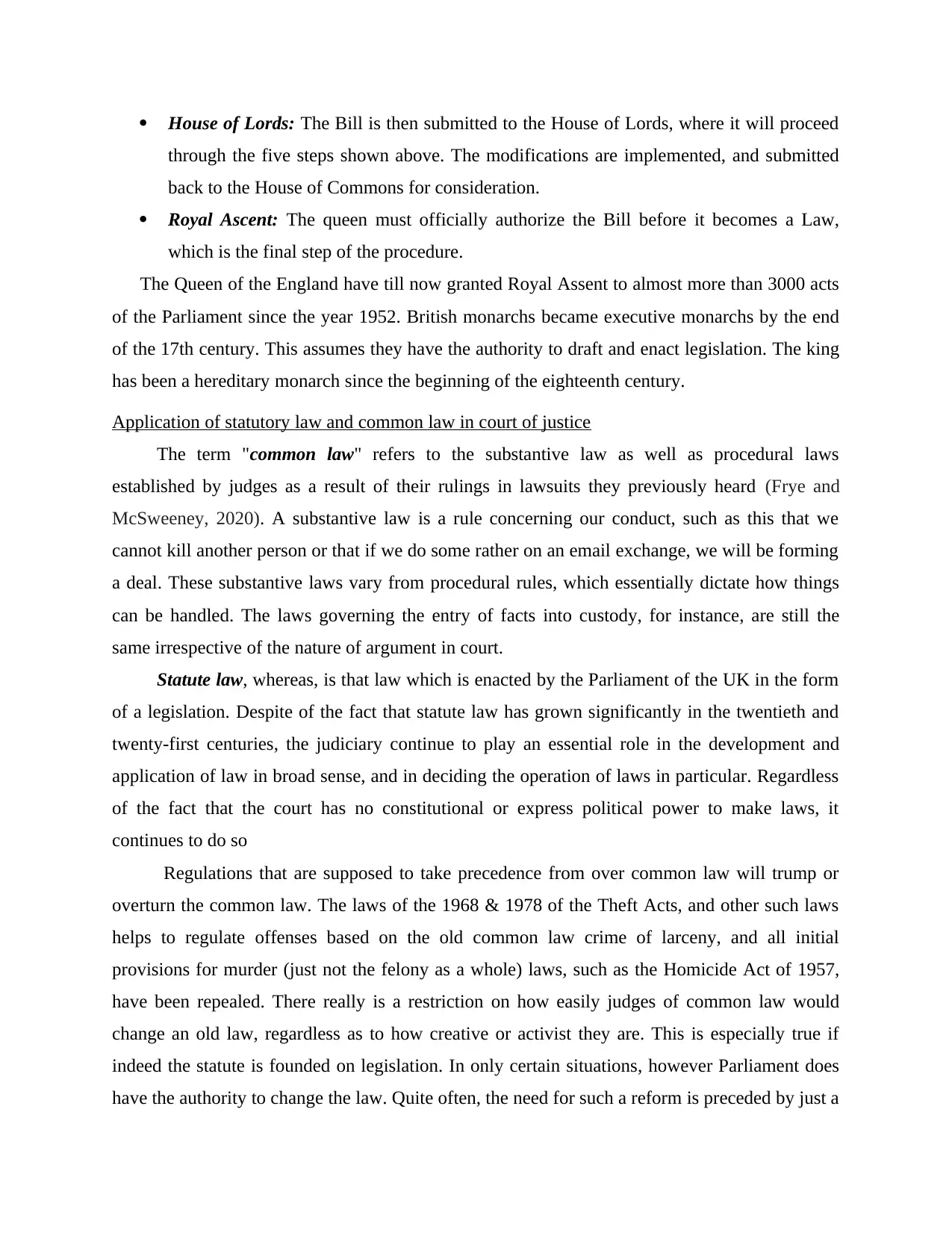
House of Lords: The Bill is then submitted to the House of Lords, where it will proceed
through the five steps shown above. The modifications are implemented, and submitted
back to the House of Commons for consideration.
Royal Ascent: The queen must officially authorize the Bill before it becomes a Law,
which is the final step of the procedure.
The Queen of the England have till now granted Royal Assent to almost more than 3000 acts
of the Parliament since the year 1952. British monarchs became executive monarchs by the end
of the 17th century. This assumes they have the authority to draft and enact legislation. The king
has been a hereditary monarch since the beginning of the eighteenth century.
Application of statutory law and common law in court of justice
The term "common law" refers to the substantive law as well as procedural laws
established by judges as a result of their rulings in lawsuits they previously heard (Frye and
McSweeney, 2020). A substantive law is a rule concerning our conduct, such as this that we
cannot kill another person or that if we do some rather on an email exchange, we will be forming
a deal. These substantive laws vary from procedural rules, which essentially dictate how things
can be handled. The laws governing the entry of facts into custody, for instance, are still the
same irrespective of the nature of argument in court.
Statute law, whereas, is that law which is enacted by the Parliament of the UK in the form
of a legislation. Despite of the fact that statute law has grown significantly in the twentieth and
twenty-first centuries, the judiciary continue to play an essential role in the development and
application of law in broad sense, and in deciding the operation of laws in particular. Regardless
of the fact that the court has no constitutional or express political power to make laws, it
continues to do so
Regulations that are supposed to take precedence from over common law will trump or
overturn the common law. The laws of the 1968 & 1978 of the Theft Acts, and other such laws
helps to regulate offenses based on the old common law crime of larceny, and all initial
provisions for murder (just not the felony as a whole) laws, such as the Homicide Act of 1957,
have been repealed. There really is a restriction on how easily judges of common law would
change an old law, regardless as to how creative or activist they are. This is especially true if
indeed the statute is founded on legislation. In only certain situations, however Parliament does
have the authority to change the law. Quite often, the need for such a reform is preceded by just a
through the five steps shown above. The modifications are implemented, and submitted
back to the House of Commons for consideration.
Royal Ascent: The queen must officially authorize the Bill before it becomes a Law,
which is the final step of the procedure.
The Queen of the England have till now granted Royal Assent to almost more than 3000 acts
of the Parliament since the year 1952. British monarchs became executive monarchs by the end
of the 17th century. This assumes they have the authority to draft and enact legislation. The king
has been a hereditary monarch since the beginning of the eighteenth century.
Application of statutory law and common law in court of justice
The term "common law" refers to the substantive law as well as procedural laws
established by judges as a result of their rulings in lawsuits they previously heard (Frye and
McSweeney, 2020). A substantive law is a rule concerning our conduct, such as this that we
cannot kill another person or that if we do some rather on an email exchange, we will be forming
a deal. These substantive laws vary from procedural rules, which essentially dictate how things
can be handled. The laws governing the entry of facts into custody, for instance, are still the
same irrespective of the nature of argument in court.
Statute law, whereas, is that law which is enacted by the Parliament of the UK in the form
of a legislation. Despite of the fact that statute law has grown significantly in the twentieth and
twenty-first centuries, the judiciary continue to play an essential role in the development and
application of law in broad sense, and in deciding the operation of laws in particular. Regardless
of the fact that the court has no constitutional or express political power to make laws, it
continues to do so
Regulations that are supposed to take precedence from over common law will trump or
overturn the common law. The laws of the 1968 & 1978 of the Theft Acts, and other such laws
helps to regulate offenses based on the old common law crime of larceny, and all initial
provisions for murder (just not the felony as a whole) laws, such as the Homicide Act of 1957,
have been repealed. There really is a restriction on how easily judges of common law would
change an old law, regardless as to how creative or activist they are. This is especially true if
indeed the statute is founded on legislation. In only certain situations, however Parliament does
have the authority to change the law. Quite often, the need for such a reform is preceded by just a
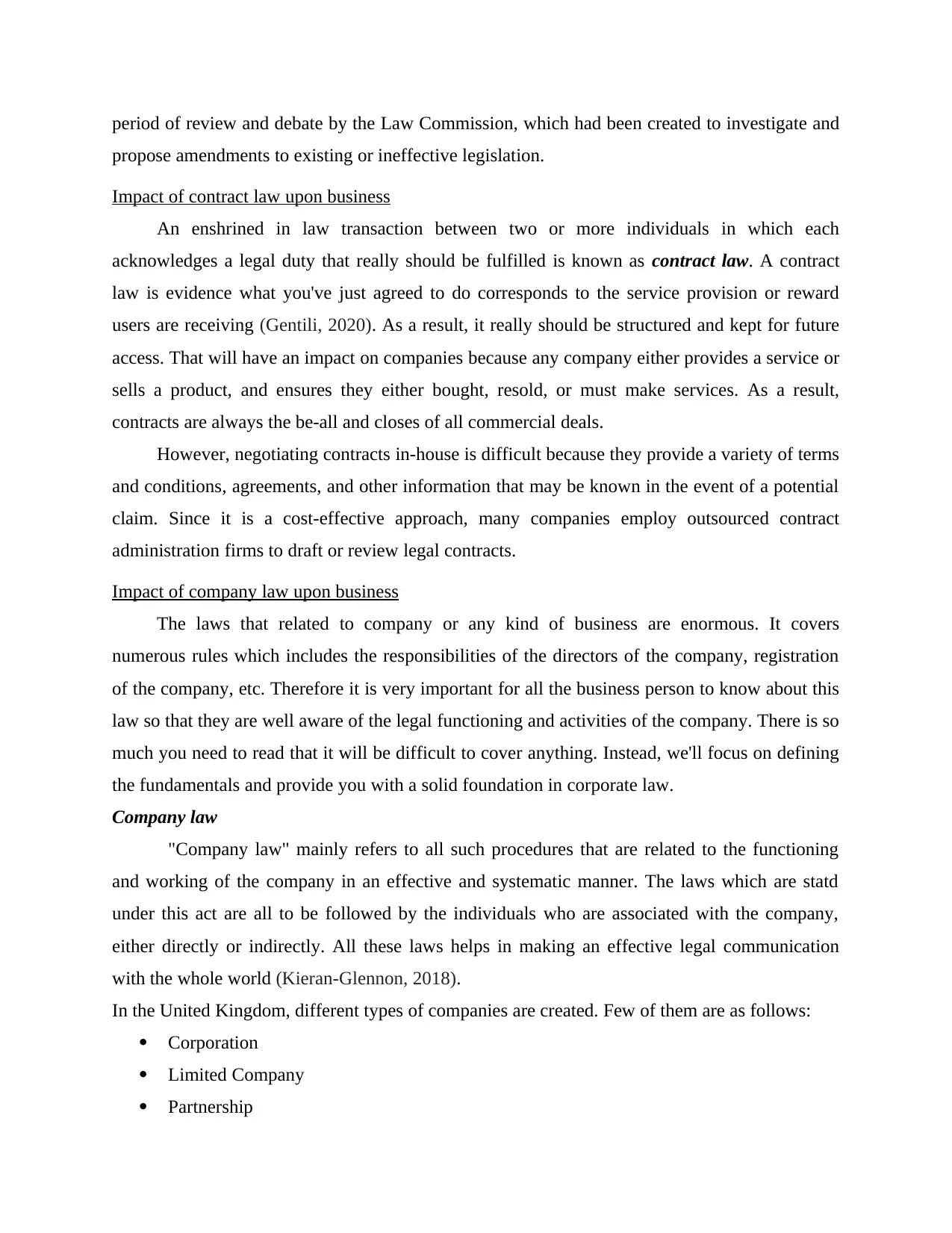
period of review and debate by the Law Commission, which had been created to investigate and
propose amendments to existing or ineffective legislation.
Impact of contract law upon business
An enshrined in law transaction between two or more individuals in which each
acknowledges a legal duty that really should be fulfilled is known as contract law. A contract
law is evidence what you've just agreed to do corresponds to the service provision or reward
users are receiving (Gentili, 2020). As a result, it really should be structured and kept for future
access. That will have an impact on companies because any company either provides a service or
sells a product, and ensures they either bought, resold, or must make services. As a result,
contracts are always the be-all and closes of all commercial deals.
However, negotiating contracts in-house is difficult because they provide a variety of terms
and conditions, agreements, and other information that may be known in the event of a potential
claim. Since it is a cost-effective approach, many companies employ outsourced contract
administration firms to draft or review legal contracts.
Impact of company law upon business
The laws that related to company or any kind of business are enormous. It covers
numerous rules which includes the responsibilities of the directors of the company, registration
of the company, etc. Therefore it is very important for all the business person to know about this
law so that they are well aware of the legal functioning and activities of the company. There is so
much you need to read that it will be difficult to cover anything. Instead, we'll focus on defining
the fundamentals and provide you with a solid foundation in corporate law.
Company law
"Company law" mainly refers to all such procedures that are related to the functioning
and working of the company in an effective and systematic manner. The laws which are statd
under this act are all to be followed by the individuals who are associated with the company,
either directly or indirectly. All these laws helps in making an effective legal communication
with the whole world (Kieran-Glennon, 2018).
In the United Kingdom, different types of companies are created. Few of them are as follows:
Corporation
Limited Company
Partnership
propose amendments to existing or ineffective legislation.
Impact of contract law upon business
An enshrined in law transaction between two or more individuals in which each
acknowledges a legal duty that really should be fulfilled is known as contract law. A contract
law is evidence what you've just agreed to do corresponds to the service provision or reward
users are receiving (Gentili, 2020). As a result, it really should be structured and kept for future
access. That will have an impact on companies because any company either provides a service or
sells a product, and ensures they either bought, resold, or must make services. As a result,
contracts are always the be-all and closes of all commercial deals.
However, negotiating contracts in-house is difficult because they provide a variety of terms
and conditions, agreements, and other information that may be known in the event of a potential
claim. Since it is a cost-effective approach, many companies employ outsourced contract
administration firms to draft or review legal contracts.
Impact of company law upon business
The laws that related to company or any kind of business are enormous. It covers
numerous rules which includes the responsibilities of the directors of the company, registration
of the company, etc. Therefore it is very important for all the business person to know about this
law so that they are well aware of the legal functioning and activities of the company. There is so
much you need to read that it will be difficult to cover anything. Instead, we'll focus on defining
the fundamentals and provide you with a solid foundation in corporate law.
Company law
"Company law" mainly refers to all such procedures that are related to the functioning
and working of the company in an effective and systematic manner. The laws which are statd
under this act are all to be followed by the individuals who are associated with the company,
either directly or indirectly. All these laws helps in making an effective legal communication
with the whole world (Kieran-Glennon, 2018).
In the United Kingdom, different types of companies are created. Few of them are as follows:
Corporation
Limited Company
Partnership
⊘ This is a preview!⊘
Do you want full access?
Subscribe today to unlock all pages.

Trusted by 1+ million students worldwide
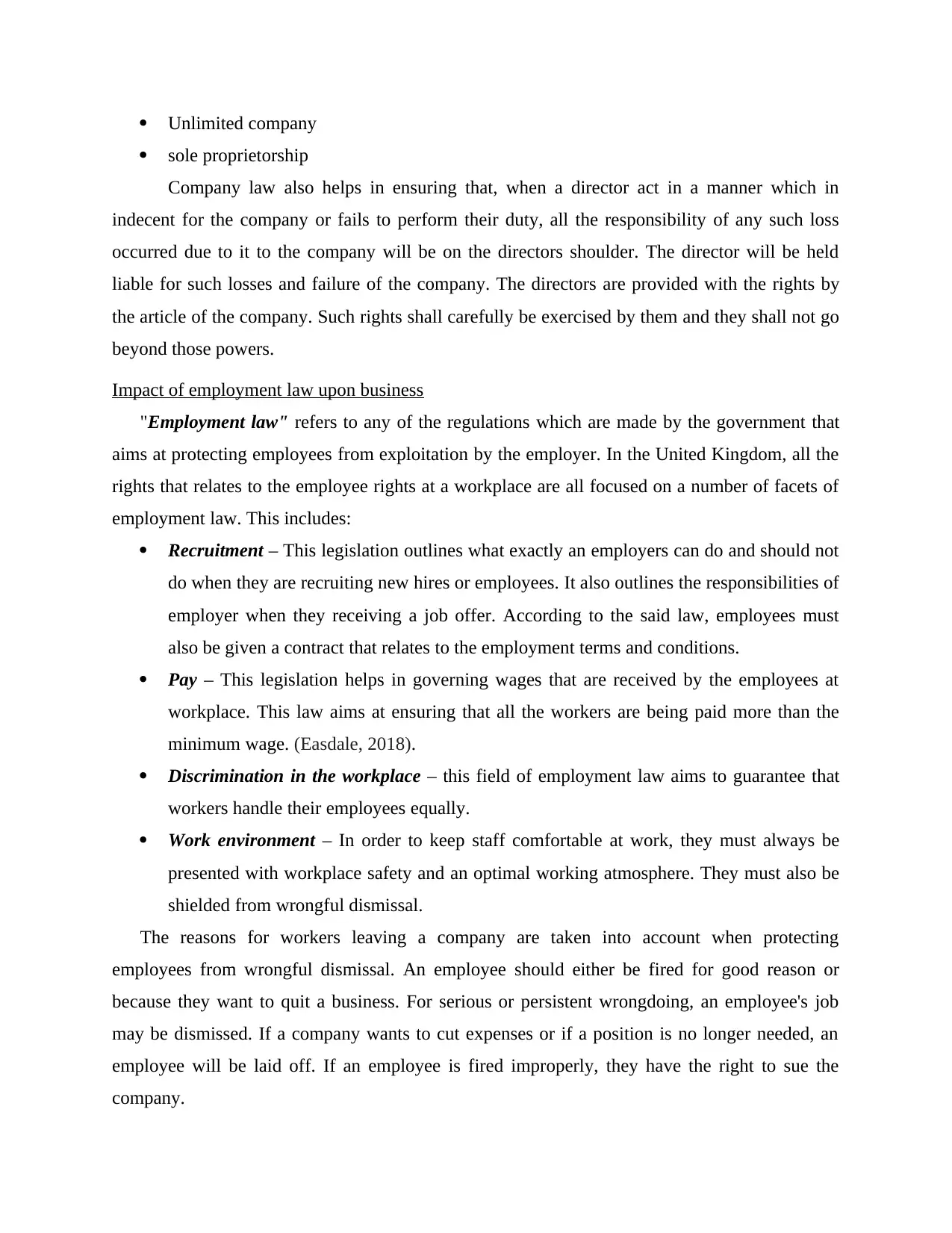
Unlimited company
sole proprietorship
Company law also helps in ensuring that, when a director act in a manner which in
indecent for the company or fails to perform their duty, all the responsibility of any such loss
occurred due to it to the company will be on the directors shoulder. The director will be held
liable for such losses and failure of the company. The directors are provided with the rights by
the article of the company. Such rights shall carefully be exercised by them and they shall not go
beyond those powers.
Impact of employment law upon business
"Employment law" refers to any of the regulations which are made by the government that
aims at protecting employees from exploitation by the employer. In the United Kingdom, all the
rights that relates to the employee rights at a workplace are all focused on a number of facets of
employment law. This includes:
Recruitment – This legislation outlines what exactly an employers can do and should not
do when they are recruiting new hires or employees. It also outlines the responsibilities of
employer when they receiving a job offer. According to the said law, employees must
also be given a contract that relates to the employment terms and conditions.
Pay – This legislation helps in governing wages that are received by the employees at
workplace. This law aims at ensuring that all the workers are being paid more than the
minimum wage. (Easdale, 2018).
Discrimination in the workplace – this field of employment law aims to guarantee that
workers handle their employees equally.
Work environment – In order to keep staff comfortable at work, they must always be
presented with workplace safety and an optimal working atmosphere. They must also be
shielded from wrongful dismissal.
The reasons for workers leaving a company are taken into account when protecting
employees from wrongful dismissal. An employee should either be fired for good reason or
because they want to quit a business. For serious or persistent wrongdoing, an employee's job
may be dismissed. If a company wants to cut expenses or if a position is no longer needed, an
employee will be laid off. If an employee is fired improperly, they have the right to sue the
company.
sole proprietorship
Company law also helps in ensuring that, when a director act in a manner which in
indecent for the company or fails to perform their duty, all the responsibility of any such loss
occurred due to it to the company will be on the directors shoulder. The director will be held
liable for such losses and failure of the company. The directors are provided with the rights by
the article of the company. Such rights shall carefully be exercised by them and they shall not go
beyond those powers.
Impact of employment law upon business
"Employment law" refers to any of the regulations which are made by the government that
aims at protecting employees from exploitation by the employer. In the United Kingdom, all the
rights that relates to the employee rights at a workplace are all focused on a number of facets of
employment law. This includes:
Recruitment – This legislation outlines what exactly an employers can do and should not
do when they are recruiting new hires or employees. It also outlines the responsibilities of
employer when they receiving a job offer. According to the said law, employees must
also be given a contract that relates to the employment terms and conditions.
Pay – This legislation helps in governing wages that are received by the employees at
workplace. This law aims at ensuring that all the workers are being paid more than the
minimum wage. (Easdale, 2018).
Discrimination in the workplace – this field of employment law aims to guarantee that
workers handle their employees equally.
Work environment – In order to keep staff comfortable at work, they must always be
presented with workplace safety and an optimal working atmosphere. They must also be
shielded from wrongful dismissal.
The reasons for workers leaving a company are taken into account when protecting
employees from wrongful dismissal. An employee should either be fired for good reason or
because they want to quit a business. For serious or persistent wrongdoing, an employee's job
may be dismissed. If a company wants to cut expenses or if a position is no longer needed, an
employee will be laid off. If an employee is fired improperly, they have the right to sue the
company.
Paraphrase This Document
Need a fresh take? Get an instant paraphrase of this document with our AI Paraphraser
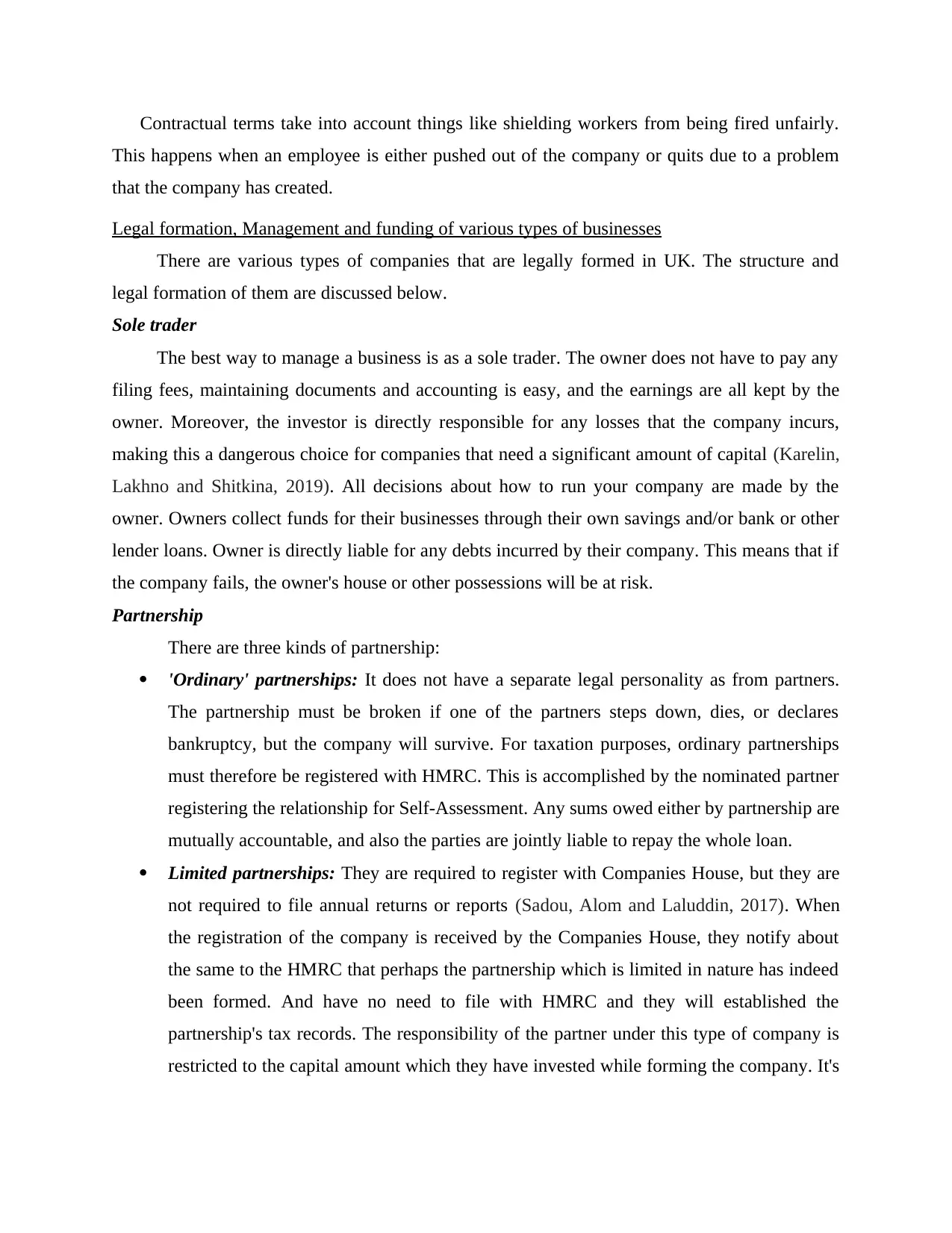
Contractual terms take into account things like shielding workers from being fired unfairly.
This happens when an employee is either pushed out of the company or quits due to a problem
that the company has created.
Legal formation, Management and funding of various types of businesses
There are various types of companies that are legally formed in UK. The structure and
legal formation of them are discussed below.
Sole trader
The best way to manage a business is as a sole trader. The owner does not have to pay any
filing fees, maintaining documents and accounting is easy, and the earnings are all kept by the
owner. Moreover, the investor is directly responsible for any losses that the company incurs,
making this a dangerous choice for companies that need a significant amount of capital (Karelin,
Lakhno and Shitkina, 2019). All decisions about how to run your company are made by the
owner. Owners collect funds for their businesses through their own savings and/or bank or other
lender loans. Owner is directly liable for any debts incurred by their company. This means that if
the company fails, the owner's house or other possessions will be at risk.
Partnership
There are three kinds of partnership:
'Ordinary' partnerships: It does not have a separate legal personality as from partners.
The partnership must be broken if one of the partners steps down, dies, or declares
bankruptcy, but the company will survive. For taxation purposes, ordinary partnerships
must therefore be registered with HMRC. This is accomplished by the nominated partner
registering the relationship for Self-Assessment. Any sums owed either by partnership are
mutually accountable, and also the parties are jointly liable to repay the whole loan.
Limited partnerships: They are required to register with Companies House, but they are
not required to file annual returns or reports (Sadou, Alom and Laluddin, 2017). When
the registration of the company is received by the Companies House, they notify about
the same to the HMRC that perhaps the partnership which is limited in nature has indeed
been formed. And have no need to file with HMRC and they will established the
partnership's tax records. The responsibility of the partner under this type of company is
restricted to the capital amount which they have invested while forming the company. It's
This happens when an employee is either pushed out of the company or quits due to a problem
that the company has created.
Legal formation, Management and funding of various types of businesses
There are various types of companies that are legally formed in UK. The structure and
legal formation of them are discussed below.
Sole trader
The best way to manage a business is as a sole trader. The owner does not have to pay any
filing fees, maintaining documents and accounting is easy, and the earnings are all kept by the
owner. Moreover, the investor is directly responsible for any losses that the company incurs,
making this a dangerous choice for companies that need a significant amount of capital (Karelin,
Lakhno and Shitkina, 2019). All decisions about how to run your company are made by the
owner. Owners collect funds for their businesses through their own savings and/or bank or other
lender loans. Owner is directly liable for any debts incurred by their company. This means that if
the company fails, the owner's house or other possessions will be at risk.
Partnership
There are three kinds of partnership:
'Ordinary' partnerships: It does not have a separate legal personality as from partners.
The partnership must be broken if one of the partners steps down, dies, or declares
bankruptcy, but the company will survive. For taxation purposes, ordinary partnerships
must therefore be registered with HMRC. This is accomplished by the nominated partner
registering the relationship for Self-Assessment. Any sums owed either by partnership are
mutually accountable, and also the parties are jointly liable to repay the whole loan.
Limited partnerships: They are required to register with Companies House, but they are
not required to file annual returns or reports (Sadou, Alom and Laluddin, 2017). When
the registration of the company is received by the Companies House, they notify about
the same to the HMRC that perhaps the partnership which is limited in nature has indeed
been formed. And have no need to file with HMRC and they will established the
partnership's tax records. The responsibility of the partner under this type of company is
restricted to the capital amount which they have invested while forming the company. It's
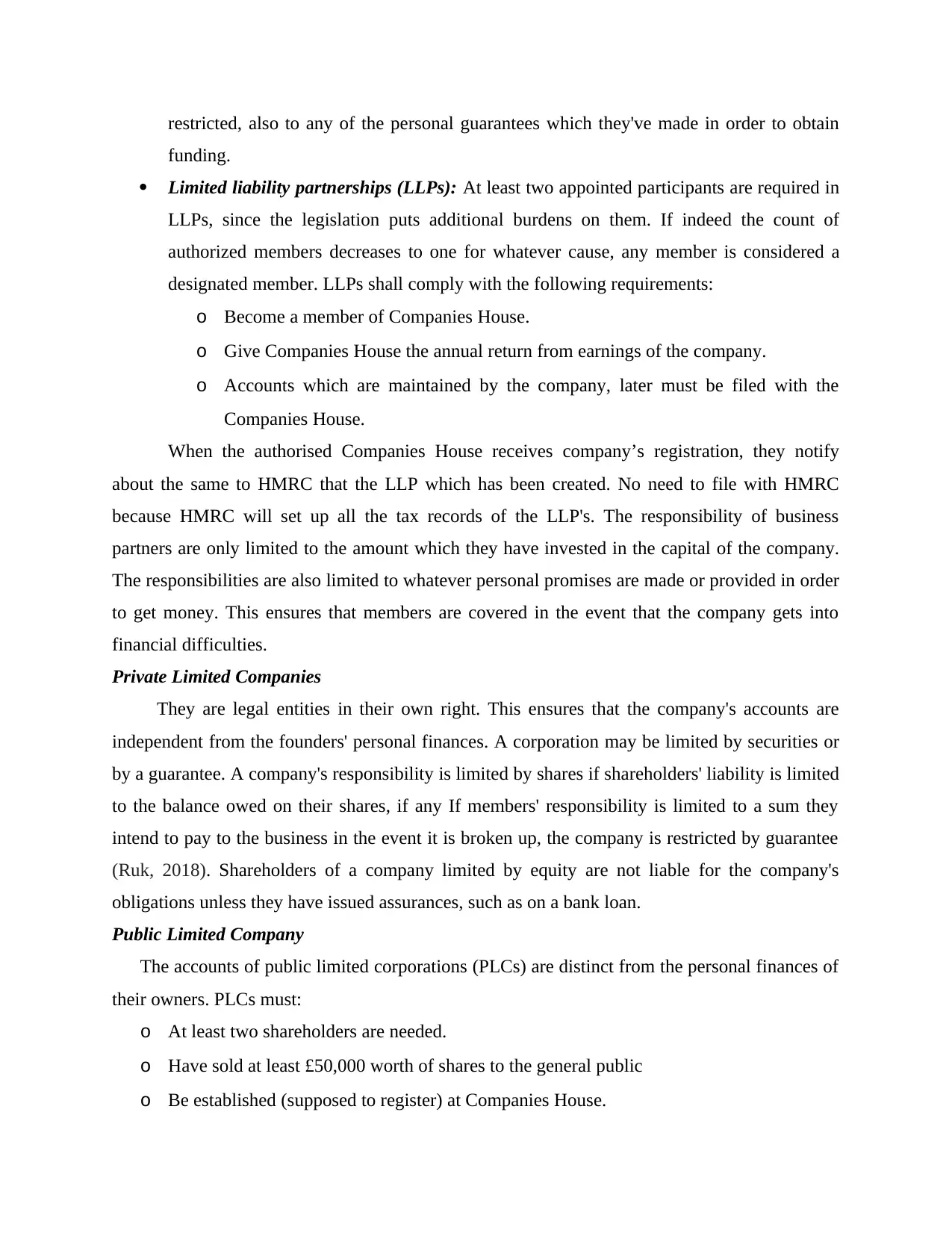
restricted, also to any of the personal guarantees which they've made in order to obtain
funding.
Limited liability partnerships (LLPs): At least two appointed participants are required in
LLPs, since the legislation puts additional burdens on them. If indeed the count of
authorized members decreases to one for whatever cause, any member is considered a
designated member. LLPs shall comply with the following requirements:
o Become a member of Companies House.
o Give Companies House the annual return from earnings of the company.
o Accounts which are maintained by the company, later must be filed with the
Companies House.
When the authorised Companies House receives company’s registration, they notify
about the same to HMRC that the LLP which has been created. No need to file with HMRC
because HMRC will set up all the tax records of the LLP's. The responsibility of business
partners are only limited to the amount which they have invested in the capital of the company.
The responsibilities are also limited to whatever personal promises are made or provided in order
to get money. This ensures that members are covered in the event that the company gets into
financial difficulties.
Private Limited Companies
They are legal entities in their own right. This ensures that the company's accounts are
independent from the founders' personal finances. A corporation may be limited by securities or
by a guarantee. A company's responsibility is limited by shares if shareholders' liability is limited
to the balance owed on their shares, if any If members' responsibility is limited to a sum they
intend to pay to the business in the event it is broken up, the company is restricted by guarantee
(Ruk, 2018). Shareholders of a company limited by equity are not liable for the company's
obligations unless they have issued assurances, such as on a bank loan.
Public Limited Company
The accounts of public limited corporations (PLCs) are distinct from the personal finances of
their owners. PLCs must:
o At least two shareholders are needed.
o Have sold at least £50,000 worth of shares to the general public
o Be established (supposed to register) at Companies House.
funding.
Limited liability partnerships (LLPs): At least two appointed participants are required in
LLPs, since the legislation puts additional burdens on them. If indeed the count of
authorized members decreases to one for whatever cause, any member is considered a
designated member. LLPs shall comply with the following requirements:
o Become a member of Companies House.
o Give Companies House the annual return from earnings of the company.
o Accounts which are maintained by the company, later must be filed with the
Companies House.
When the authorised Companies House receives company’s registration, they notify
about the same to HMRC that the LLP which has been created. No need to file with HMRC
because HMRC will set up all the tax records of the LLP's. The responsibility of business
partners are only limited to the amount which they have invested in the capital of the company.
The responsibilities are also limited to whatever personal promises are made or provided in order
to get money. This ensures that members are covered in the event that the company gets into
financial difficulties.
Private Limited Companies
They are legal entities in their own right. This ensures that the company's accounts are
independent from the founders' personal finances. A corporation may be limited by securities or
by a guarantee. A company's responsibility is limited by shares if shareholders' liability is limited
to the balance owed on their shares, if any If members' responsibility is limited to a sum they
intend to pay to the business in the event it is broken up, the company is restricted by guarantee
(Ruk, 2018). Shareholders of a company limited by equity are not liable for the company's
obligations unless they have issued assurances, such as on a bank loan.
Public Limited Company
The accounts of public limited corporations (PLCs) are distinct from the personal finances of
their owners. PLCs must:
o At least two shareholders are needed.
o Have sold at least £50,000 worth of shares to the general public
o Be established (supposed to register) at Companies House.
⊘ This is a preview!⊘
Do you want full access?
Subscribe today to unlock all pages.

Trusted by 1+ million students worldwide
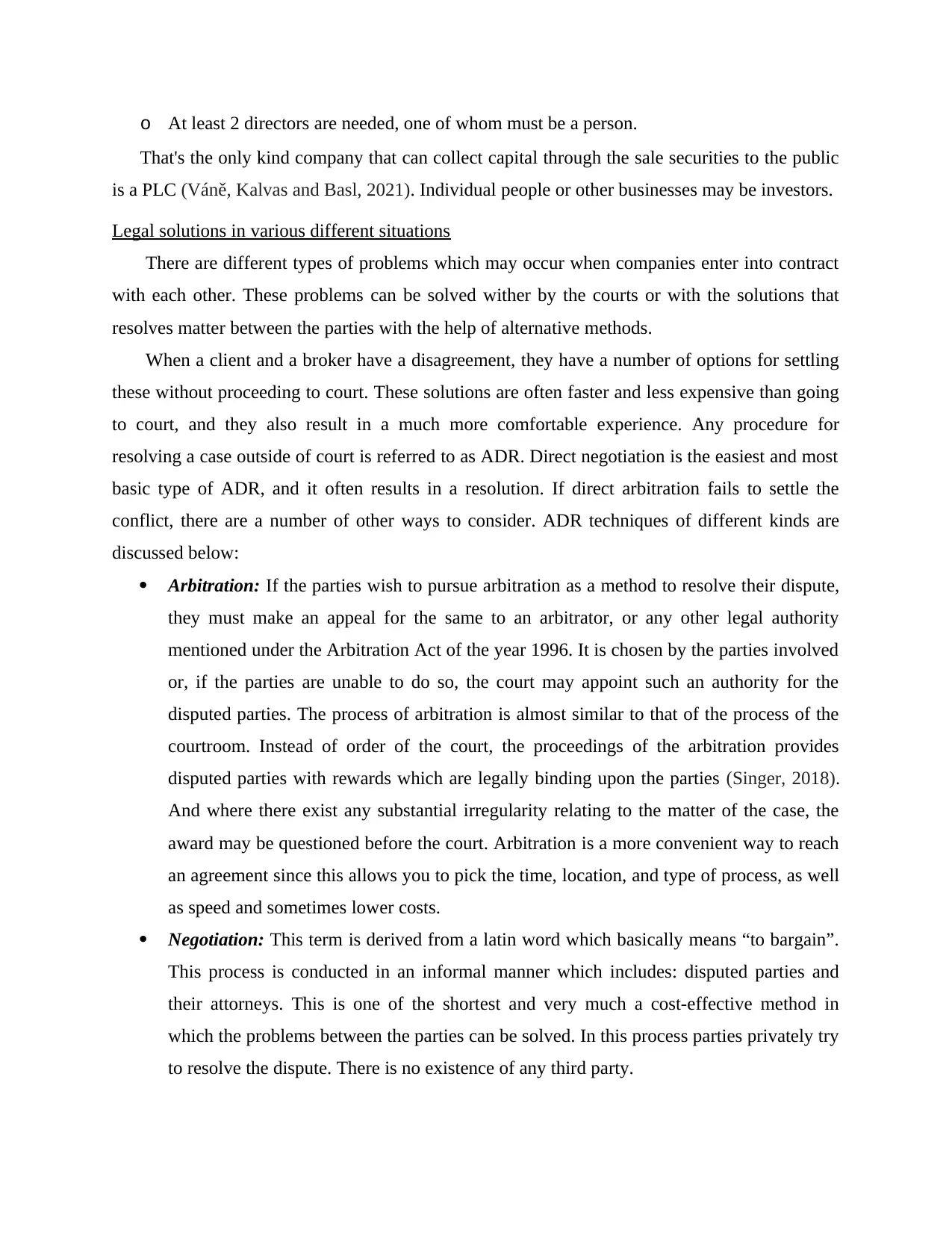
o At least 2 directors are needed, one of whom must be a person.
That's the only kind company that can collect capital through the sale securities to the public
is a PLC (Váně, Kalvas and Basl, 2021). Individual people or other businesses may be investors.
Legal solutions in various different situations
There are different types of problems which may occur when companies enter into contract
with each other. These problems can be solved wither by the courts or with the solutions that
resolves matter between the parties with the help of alternative methods.
When a client and a broker have a disagreement, they have a number of options for settling
these without proceeding to court. These solutions are often faster and less expensive than going
to court, and they also result in a much more comfortable experience. Any procedure for
resolving a case outside of court is referred to as ADR. Direct negotiation is the easiest and most
basic type of ADR, and it often results in a resolution. If direct arbitration fails to settle the
conflict, there are a number of other ways to consider. ADR techniques of different kinds are
discussed below:
Arbitration: If the parties wish to pursue arbitration as a method to resolve their dispute,
they must make an appeal for the same to an arbitrator, or any other legal authority
mentioned under the Arbitration Act of the year 1996. It is chosen by the parties involved
or, if the parties are unable to do so, the court may appoint such an authority for the
disputed parties. The process of arbitration is almost similar to that of the process of the
courtroom. Instead of order of the court, the proceedings of the arbitration provides
disputed parties with rewards which are legally binding upon the parties (Singer, 2018).
And where there exist any substantial irregularity relating to the matter of the case, the
award may be questioned before the court. Arbitration is a more convenient way to reach
an agreement since this allows you to pick the time, location, and type of process, as well
as speed and sometimes lower costs.
Negotiation: This term is derived from a latin word which basically means “to bargain”.
This process is conducted in an informal manner which includes: disputed parties and
their attorneys. This is one of the shortest and very much a cost-effective method in
which the problems between the parties can be solved. In this process parties privately try
to resolve the dispute. There is no existence of any third party.
That's the only kind company that can collect capital through the sale securities to the public
is a PLC (Váně, Kalvas and Basl, 2021). Individual people or other businesses may be investors.
Legal solutions in various different situations
There are different types of problems which may occur when companies enter into contract
with each other. These problems can be solved wither by the courts or with the solutions that
resolves matter between the parties with the help of alternative methods.
When a client and a broker have a disagreement, they have a number of options for settling
these without proceeding to court. These solutions are often faster and less expensive than going
to court, and they also result in a much more comfortable experience. Any procedure for
resolving a case outside of court is referred to as ADR. Direct negotiation is the easiest and most
basic type of ADR, and it often results in a resolution. If direct arbitration fails to settle the
conflict, there are a number of other ways to consider. ADR techniques of different kinds are
discussed below:
Arbitration: If the parties wish to pursue arbitration as a method to resolve their dispute,
they must make an appeal for the same to an arbitrator, or any other legal authority
mentioned under the Arbitration Act of the year 1996. It is chosen by the parties involved
or, if the parties are unable to do so, the court may appoint such an authority for the
disputed parties. The process of arbitration is almost similar to that of the process of the
courtroom. Instead of order of the court, the proceedings of the arbitration provides
disputed parties with rewards which are legally binding upon the parties (Singer, 2018).
And where there exist any substantial irregularity relating to the matter of the case, the
award may be questioned before the court. Arbitration is a more convenient way to reach
an agreement since this allows you to pick the time, location, and type of process, as well
as speed and sometimes lower costs.
Negotiation: This term is derived from a latin word which basically means “to bargain”.
This process is conducted in an informal manner which includes: disputed parties and
their attorneys. This is one of the shortest and very much a cost-effective method in
which the problems between the parties can be solved. In this process parties privately try
to resolve the dispute. There is no existence of any third party.
Paraphrase This Document
Need a fresh take? Get an instant paraphrase of this document with our AI Paraphraser
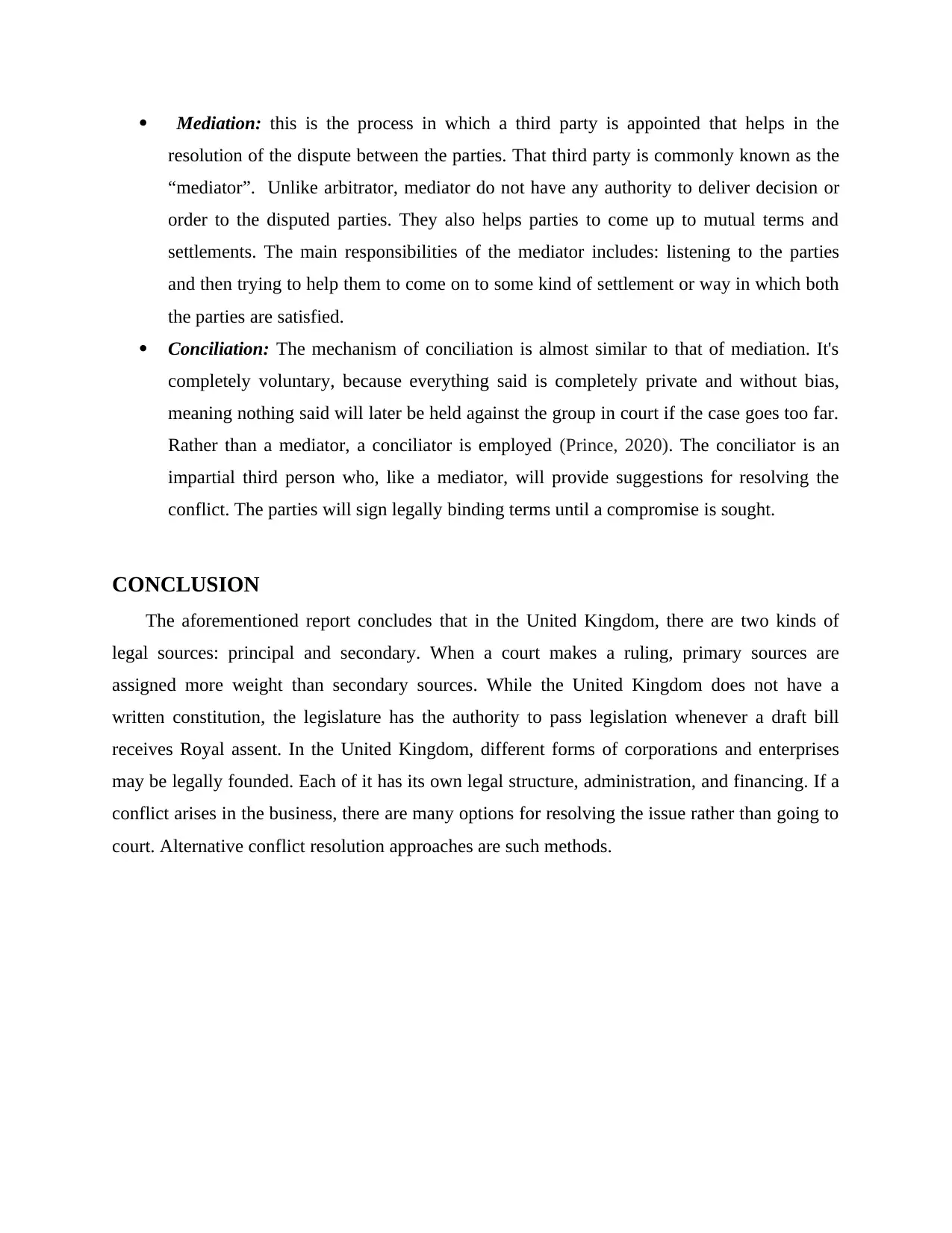
Mediation: this is the process in which a third party is appointed that helps in the
resolution of the dispute between the parties. That third party is commonly known as the
“mediator”. Unlike arbitrator, mediator do not have any authority to deliver decision or
order to the disputed parties. They also helps parties to come up to mutual terms and
settlements. The main responsibilities of the mediator includes: listening to the parties
and then trying to help them to come on to some kind of settlement or way in which both
the parties are satisfied.
Conciliation: The mechanism of conciliation is almost similar to that of mediation. It's
completely voluntary, because everything said is completely private and without bias,
meaning nothing said will later be held against the group in court if the case goes too far.
Rather than a mediator, a conciliator is employed (Prince, 2020). The conciliator is an
impartial third person who, like a mediator, will provide suggestions for resolving the
conflict. The parties will sign legally binding terms until a compromise is sought.
CONCLUSION
The aforementioned report concludes that in the United Kingdom, there are two kinds of
legal sources: principal and secondary. When a court makes a ruling, primary sources are
assigned more weight than secondary sources. While the United Kingdom does not have a
written constitution, the legislature has the authority to pass legislation whenever a draft bill
receives Royal assent. In the United Kingdom, different forms of corporations and enterprises
may be legally founded. Each of it has its own legal structure, administration, and financing. If a
conflict arises in the business, there are many options for resolving the issue rather than going to
court. Alternative conflict resolution approaches are such methods.
resolution of the dispute between the parties. That third party is commonly known as the
“mediator”. Unlike arbitrator, mediator do not have any authority to deliver decision or
order to the disputed parties. They also helps parties to come up to mutual terms and
settlements. The main responsibilities of the mediator includes: listening to the parties
and then trying to help them to come on to some kind of settlement or way in which both
the parties are satisfied.
Conciliation: The mechanism of conciliation is almost similar to that of mediation. It's
completely voluntary, because everything said is completely private and without bias,
meaning nothing said will later be held against the group in court if the case goes too far.
Rather than a mediator, a conciliator is employed (Prince, 2020). The conciliator is an
impartial third person who, like a mediator, will provide suggestions for resolving the
conflict. The parties will sign legally binding terms until a compromise is sought.
CONCLUSION
The aforementioned report concludes that in the United Kingdom, there are two kinds of
legal sources: principal and secondary. When a court makes a ruling, primary sources are
assigned more weight than secondary sources. While the United Kingdom does not have a
written constitution, the legislature has the authority to pass legislation whenever a draft bill
receives Royal assent. In the United Kingdom, different forms of corporations and enterprises
may be legally founded. Each of it has its own legal structure, administration, and financing. If a
conflict arises in the business, there are many options for resolving the issue rather than going to
court. Alternative conflict resolution approaches are such methods.
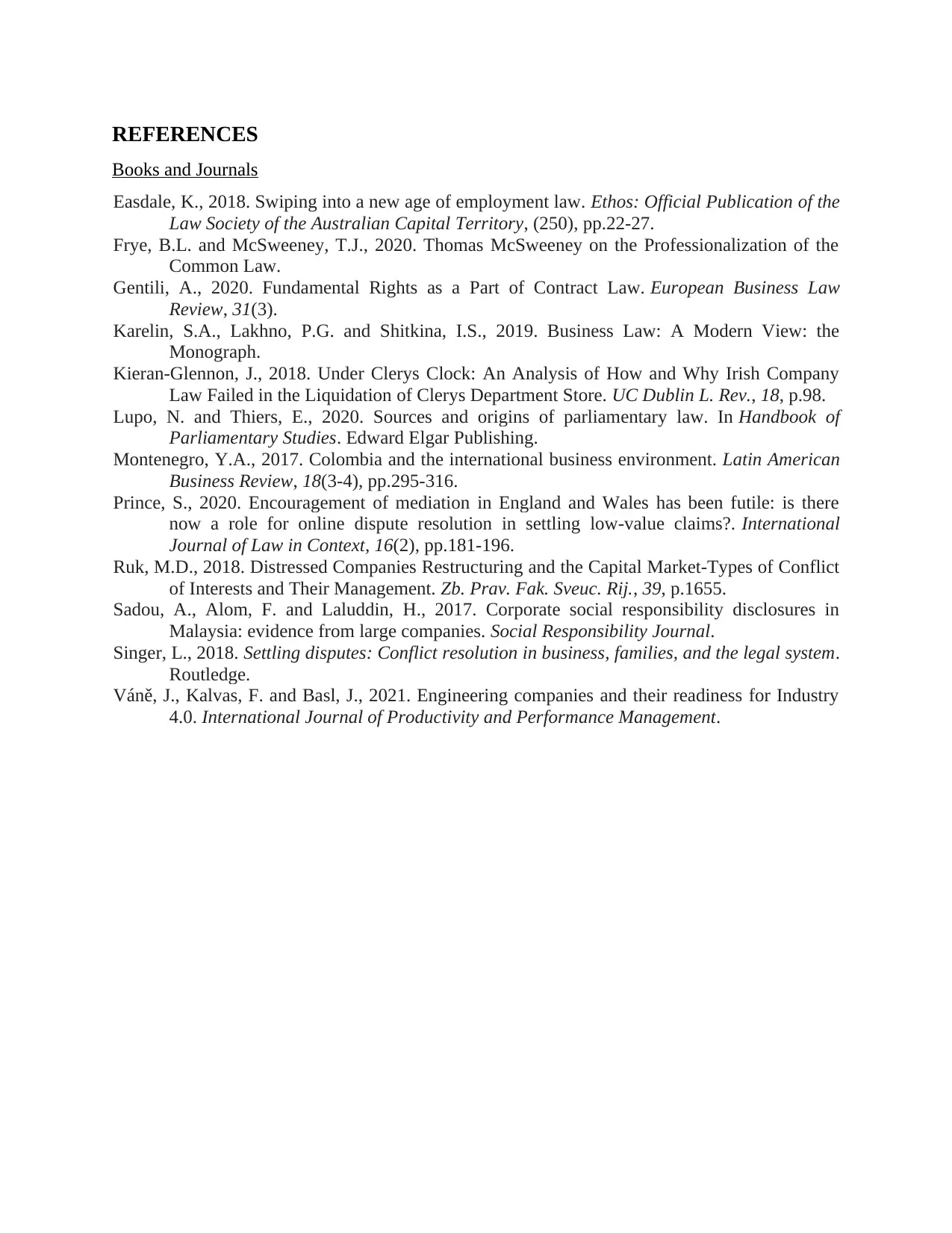
REFERENCES
Books and Journals
Easdale, K., 2018. Swiping into a new age of employment law. Ethos: Official Publication of the
Law Society of the Australian Capital Territory, (250), pp.22-27.
Frye, B.L. and McSweeney, T.J., 2020. Thomas McSweeney on the Professionalization of the
Common Law.
Gentili, A., 2020. Fundamental Rights as a Part of Contract Law. European Business Law
Review, 31(3).
Karelin, S.A., Lakhno, P.G. and Shitkina, I.S., 2019. Business Law: A Modern View: the
Monograph.
Kieran-Glennon, J., 2018. Under Clerys Clock: An Analysis of How and Why Irish Company
Law Failed in the Liquidation of Clerys Department Store. UC Dublin L. Rev., 18, p.98.
Lupo, N. and Thiers, E., 2020. Sources and origins of parliamentary law. In Handbook of
Parliamentary Studies. Edward Elgar Publishing.
Montenegro, Y.A., 2017. Colombia and the international business environment. Latin American
Business Review, 18(3-4), pp.295-316.
Prince, S., 2020. Encouragement of mediation in England and Wales has been futile: is there
now a role for online dispute resolution in settling low-value claims?. International
Journal of Law in Context, 16(2), pp.181-196.
Ruk, M.D., 2018. Distressed Companies Restructuring and the Capital Market-Types of Conflict
of Interests and Their Management. Zb. Prav. Fak. Sveuc. Rij., 39, p.1655.
Sadou, A., Alom, F. and Laluddin, H., 2017. Corporate social responsibility disclosures in
Malaysia: evidence from large companies. Social Responsibility Journal.
Singer, L., 2018. Settling disputes: Conflict resolution in business, families, and the legal system.
Routledge.
Váně, J., Kalvas, F. and Basl, J., 2021. Engineering companies and their readiness for Industry
4.0. International Journal of Productivity and Performance Management.
Books and Journals
Easdale, K., 2018. Swiping into a new age of employment law. Ethos: Official Publication of the
Law Society of the Australian Capital Territory, (250), pp.22-27.
Frye, B.L. and McSweeney, T.J., 2020. Thomas McSweeney on the Professionalization of the
Common Law.
Gentili, A., 2020. Fundamental Rights as a Part of Contract Law. European Business Law
Review, 31(3).
Karelin, S.A., Lakhno, P.G. and Shitkina, I.S., 2019. Business Law: A Modern View: the
Monograph.
Kieran-Glennon, J., 2018. Under Clerys Clock: An Analysis of How and Why Irish Company
Law Failed in the Liquidation of Clerys Department Store. UC Dublin L. Rev., 18, p.98.
Lupo, N. and Thiers, E., 2020. Sources and origins of parliamentary law. In Handbook of
Parliamentary Studies. Edward Elgar Publishing.
Montenegro, Y.A., 2017. Colombia and the international business environment. Latin American
Business Review, 18(3-4), pp.295-316.
Prince, S., 2020. Encouragement of mediation in England and Wales has been futile: is there
now a role for online dispute resolution in settling low-value claims?. International
Journal of Law in Context, 16(2), pp.181-196.
Ruk, M.D., 2018. Distressed Companies Restructuring and the Capital Market-Types of Conflict
of Interests and Their Management. Zb. Prav. Fak. Sveuc. Rij., 39, p.1655.
Sadou, A., Alom, F. and Laluddin, H., 2017. Corporate social responsibility disclosures in
Malaysia: evidence from large companies. Social Responsibility Journal.
Singer, L., 2018. Settling disputes: Conflict resolution in business, families, and the legal system.
Routledge.
Váně, J., Kalvas, F. and Basl, J., 2021. Engineering companies and their readiness for Industry
4.0. International Journal of Productivity and Performance Management.
⊘ This is a preview!⊘
Do you want full access?
Subscribe today to unlock all pages.

Trusted by 1+ million students worldwide
1 out of 12
Related Documents
Your All-in-One AI-Powered Toolkit for Academic Success.
+13062052269
info@desklib.com
Available 24*7 on WhatsApp / Email
![[object Object]](/_next/static/media/star-bottom.7253800d.svg)
Unlock your academic potential
Copyright © 2020–2026 A2Z Services. All Rights Reserved. Developed and managed by ZUCOL.




